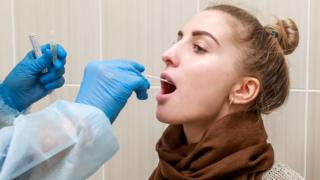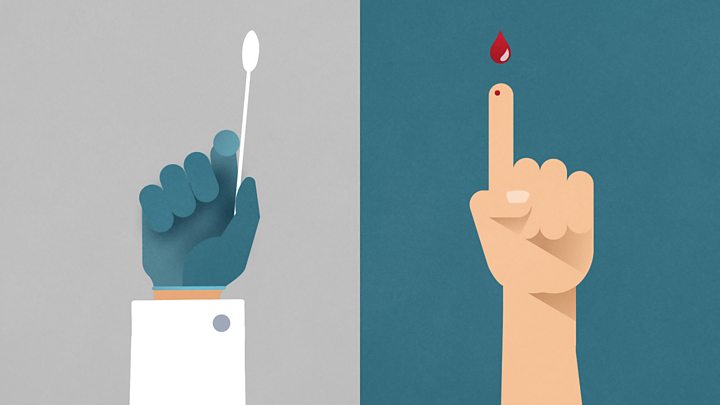 Image copyright
Getty Images
Image copyright
Getty Images
New 90-minute tests that can detect coronavirus and flu will be rolled out in care homes and laboratories from next week.
The "on-the-spot" swab and DNA tests will help distinguish between Covid-19 and other seasonal illnesses, the government said.
The health secretary said this would be "hugely beneficial" over the winter.
Currently, three quarters of test results are returned within 24 hours and a quarter can take up to two days.
The announcement comes as the government pushed back a July target to regularly test care home staff and residents, saying the number of testing kits had become more limited.
Almost half a million of the new rapid swab tests, called LamPORE, will be available from next week in adult care settings and laboratories, with millions more due to be rolled out later in the year.
There is currently no publicly available data on the accuracy of the new tests but Sir John Bell, Regius Professor of Medicine at Oxford University, who has been advising the government on tests, said they produced the same "sensitivity" as the current lab-based tests.
Additionally, thousands of DNA test machines, which have already been used in eight London hospitals and can analyse nose swabs, will be rolled out across NHS hospitals from September.
Around 5,000 machines will provide 5.8 million tests in the coming months, the department said.
Health Secretary Matt Hancock described these latest innovations in coronavirus testing as "life-saving".
He added: "Millions of new rapid coronavirus tests will provide on-the-spot results in under 90 minutes, helping us to break chains of transmission quickly.
"The fact these tests can detect flu as well as Covid-19 will be hugely beneficial as we head into winter, so patients can follow the right advice to protect themselves and others."
Business Minister Nadhim Zahawi told BBC Breakfast 450,000 Oxford Nanopore LamPORE tests will be rolled out from next week and then DnaNudge test machines will go into the NHS labs and into other settings, with the hope of providing capacity for 5.8m tests in the coming months.
Analysis
By Lauren Moss, health correspondent
There's been a lot of focus on how long Covid test results can take to come back and the impact that has on halting the spread of the virus.
Overall, three quarters of results are now returned within 24 hours but some can still take up to two days.
The new rapid tests that can analyse swabs in pop up mobile labs and provide results in 90 minutes is hugely significant.
No data on the accuracy of these tests has been made publicly available yet but those behind them say there are controls in place to check for false negatives.
And another major benefit sees the tests able to detect other winter illnesses, such as the flu, so doctors will know whether someone presenting with coronavirus symptoms has the virus or something else.
It comes as:
Authorities in Greater Manchester insisted people should not be alarmed by a decision to declare a "major incident" on Sunday evening in response to rising rates of Covid-19 there. Scotland's national clinical director warned of going "backwards" over easing lockdown after a cluster of coronavirus cases were linked to a pub in Aberdeen. Leicester - the first UK city to have a localised lockdown - will see pubs and restaurants reopen from Monday as a number of restrictions are lifted. A government scheme to encourage people to visit restaurants, cafes and pubs, across the UK has now launched - giving customers of 72,000 establishments 50% off meals bought from Monday to Wednesday in August. Image copyright PA Media Image caption The announcement comes as people are encouraged to "eat out to help out" and offered 50% off meals in order to support restaurants, cafes and pubsCoronavirus tests are currently carried out at drive-through or walk-in sites as well as at hospitals for patients and some NHS workers.
Home testing kits can also be delivered to someone's door so that people can test themselves. Swab samples are analysed at a laboratory before the result is passed on to the individual.
Unlike other seasonal illnesses, those infected with Covid-19 are required to self-isolate for 10 days.

Media playback is unsupported on your device
Regular testing of care home residents and staff was meant to have started on 6 July but officials said this might not be in place until the end of the first week of September.
A spokeswoman for the Department of Health said: "A combination of factors have meant that a more limited number of testing kits, predominantly used in care homes, are currently available for asymptomatic re-testing and we are working round the clock with providers to restore capacity."
Last month, the government withdrew one brand of home-testing kits used in care homes over safety concerns.
Meanwhile, researchers are urgently appealing for recovered patients to donate their blood plasma - as part of a major trial looking at how effective transfusing blood plasma into patients struggling to develop their own immune response to Covid-19 could be.
A further eight deaths were reported in the UK on Sunday, taking the total number of people who have died after testing positive for the virus to 46,201. However figures tend to be lower at the weekend due to reporting delays.
The latest government statistics also showed 744 new cases had been confirmed in the 24 hours to 09:00 on Sunday.

 5 years ago
518
5 years ago
518 

